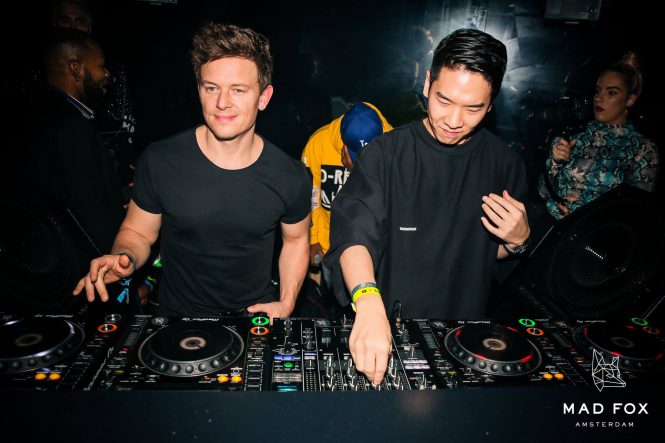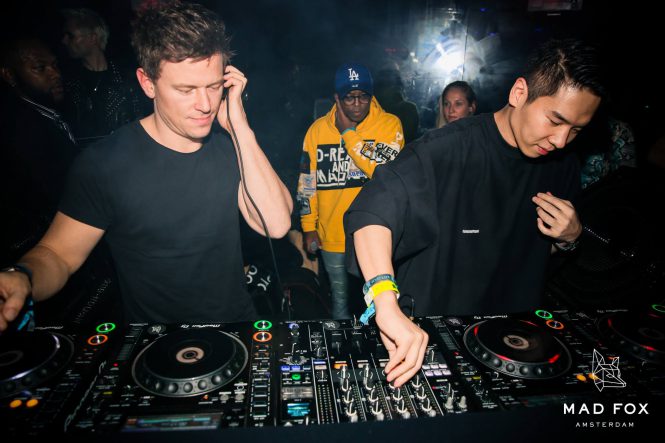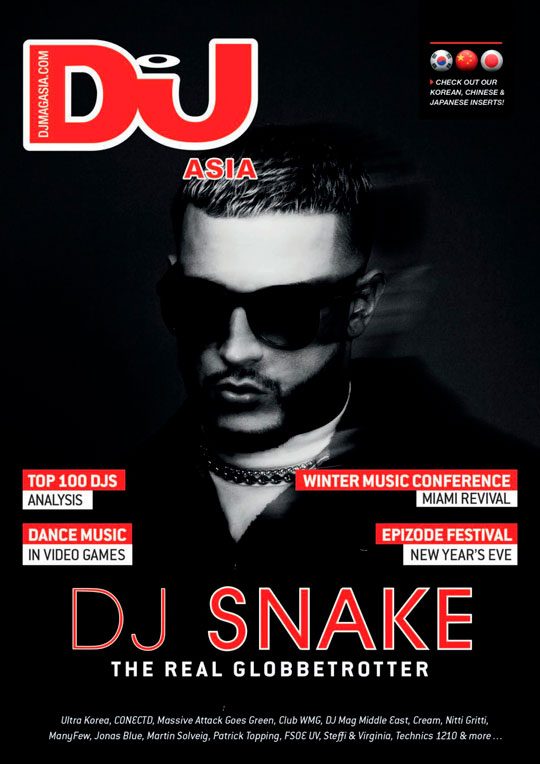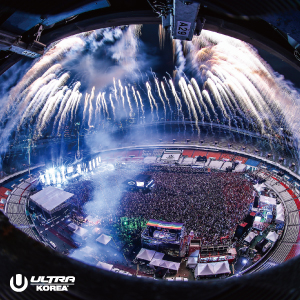Features
![[INTERVIEW] FEDDE LE GRAND](https://djmagasia.com/wp-content/uploads/2018/11/46697723_1952803915021538_8113107430172262400_o-665x400.jpg)
[INTERVIEW] FEDDE LE GRAND
A Meeting with Fedde Le Grand at Armada’s press brunch during the ADE
Interviewer: Daehwa Lee, Translator: Binna Kim
Despite a long run of 16 years in the scene, Fedde Le Grand’s popularity doesn’t seem to be cooling down. This year again, he was on the main stage of Ultra Miami and Tomorrowland, and he was ranked 22nd in this year’s DJ Mag Top 100 poll, rising 17 places up from last year. He’s the pioneer who led the boom of electro house in 2006 with ‘Put Your Hands Up for Detroit.’ His ‘Rhythm of the Night’ from 2016 is still picked up on dance floors through the world.
DJ Mag Asia met Fedde Le Grand at Armada’s press brunch during his visit in Amsterdam for the ADE. A day before the interview, he had given a back 2 back performance with the Korean DJ, Raiden, at the DJ Mag Asia’s launch party at Mad Fox, Amsterdam.
Q: What kind of activities have you done and are you still planning to do in this year’s ADE?
Fedde: It’s always several things. I do a few meetings with sometimes other artists and sometimes also developers, so it depends a little bit on which year. Almost every year, I do a few, sort of, surprise gigs, which I did here yesterday. I was here with you guys, as well, which is always very nice. It’s a great way do back 2 back stuff with colleagues that you don’t always get to do.
Q: Would you give us any tip to enjoy the most the ADE?
Fedde: I personally would always do a few different things. First of all, I would enjoy the city a little bit, because there is a lot to see, and we are right in the center of it, which is great. But I would always do one or two panels that you think are interesting. There’s always a lot to learn. Whatever your interest is, if it’s how to do better on social media, or if it’s producing, or maybe speakers. There’s so much interesting stuff, so I would always do that. Usually there are producer classes as well, which would have my personal interest. I did one last year, but I also attended one, because there is always something to learn.
Q: What do you think it would be the most attractive point of Netherland and Amsterdam?
Fedde: I think it’s better to ask you that question. I think the city has a lot of history. I think the canals, there’s only two cities. It’s almost like Venice a little bit, I think. Especially if it’s a little sunny like it is today, I think there is so much to see, there is so much to learn. We have a lot of museums as well. I think most of the things that you want to see or know about Holland, you can find it in Amsterdam.

Q: Recently, through the TGB(The Gaming Beat) Charity project you released 3 singles and donated 90,000 dollars for charity. It was a really interesting project. Would you give us more explain about this?
Fedde: Well, it’s actually a collaboration between me, DJ Mag and BBIN. The money comes from BBIN but they only want to donate it if we would make 1 million downloads or more of course, which we made it which was great. DJ Mag kind of distributes, because we have several charities, so they use the money for all the charities and divide equally. And then, we also did like a special racing day. We have a car circuit nearby. That was also for charity. So we raised some excellent money for Lymph & Co. which is a cancer foundation. And DJ Mag, we raised two checks by racing, and it was me and several other DJs and some famous Dutch people. So, I think, especially as an artist, if you have the chance to do anything small or big, you have to do it.
Q: ’Put Your Hands Up For Detroit’ and ‘Let Me Think About It’ are 2 tracks that predicted the hit of the electronic house music. Did you foresee that this sound would become that much popular?
Fedde: No, to be really honest, I remember discussing with my label partner, because put your hands up for Detroit came out on our own label first. And I wasn’t really sure if I wanted to put it out at all. I was like, I don’t know, it’s so different, especially back then, from everything else, we shouldn’t do it. I actually said to my partner, if we make it a B side, I will make two extra tracks, and we will… but he, god bless him, made it the A side. Yeah, it blew up it Holland and in England. Actually later we got in contact with Ida Corr from ‘Let Me Think About It’ because. Also a strange story, she was with a company that also mainly did music for elevators, so it was very loungy, very down-tempo music. And they contacted us like, “we have this amazing singer but she doesn’t really do lounge music. Maybe you guys…” and I was just in love with this track right away.
Q: How did you start making this electro sound?
Fedde: Back then I was playing house music, but there were a few tracks that had just a teeny tiny influence of something more electronic. To be honest, I wanted to make disco house but I didn’t have samples. I didn’t know where to get them. So I tried to get the same vibe with synthesizers, so that’s how it kind of came together.
Q: What do you think are the differences between the electronic dance scene of that time and now?
Fedde: On a music level or on a business level?
Q: Both of them
Fedde: I think, funny enough, if I look at the music back the and I used to do parties here before I started playing internationally and if I look at that music, of course it sounds better now, because there’s so much better techniques. But it’s almost the same music now if I look at Oliver Heldens. And you can ask Oliver, he actually got a lot of inspiration from that time, not only from me, but from that time. So, I think it’s funny that after about twelve years it’s almost full circle again, so that’s very interesting. I think that music kind of makes a full circle every so many years. If you look at pop music, as well, it goes more that direction, that direction, and then after a while you are back where you started. But I think that the scene now, everything is way more serious, because it became a bigger industry. I remember back then, for instance ‘Let Me Think About It’, we labeled as “indie pop” music, because in the American scene, if anything was called dance, they wouldn’t play it at all. It was such a different overall scene.

Q: Would you tell us about your future upcoming plans? About new singles, tours, projects, etc.?
Fedde: I have three collabs planned. I can’t say all the details, but two with a Dutch artist, one with a Chinese artist that’s for sure, and then I will have my solos, as well. So, I usually try to release a track every two months because it’s enough and not too much so that you can give every track as much attention as it deserves. And show wise, I am still developing a full show. I did a pretty good show here in Holland called GRAND and we want to see if we can make that travel. Other than that it’s, I don’t want to say “the usual,” but hopefully Tomorrowland and Ultra so many big festivals. This summer has been so great, and it will be the same next year, I hope.
Q: You’re one of the most beloved DJs in Asia. Please give us a word to all our DJ Mag Asia’s readers.
Fedde: First of all, I am super honored. What I like the most is that I think you guys totally embrace dance music. It’s been there because I remember did some gigs in Japan and Indonesia ten years ago. But, you can see also it’s grown so much. I think for an artist it is always about the energy that you get from the crowd. I think probably any other DJ would agree. In Asia, especially at the moment, it is second to none. The energy is so amazing, and they pretty much know all your songs. (B: It’s surprising?) It’s not surprising, but you can’t wish for anything more as an artist. You know, they know the music. You play, they know every word, and they give you all that energy, which is amazing.
November 27th, 2018








